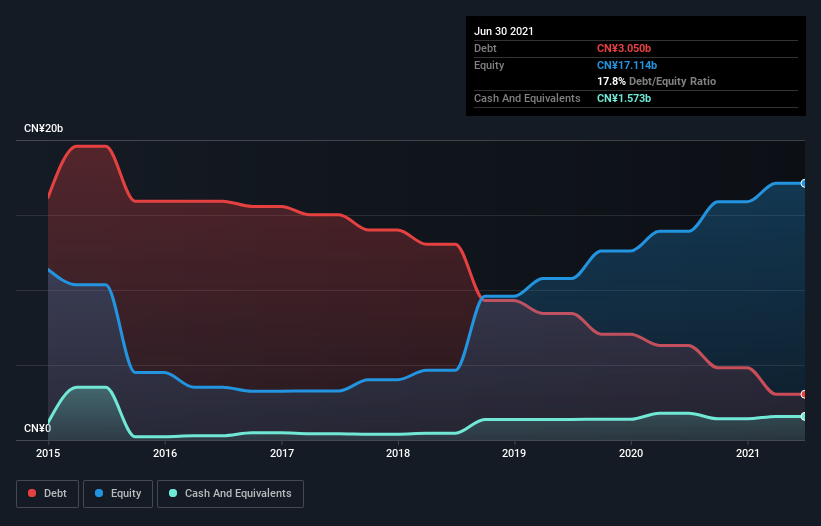Legendary fund manager Li Lu (who Charlie Munger backed) once said, 'The biggest investment risk is not the volatility of prices, but whether you will suffer a permanent loss of capital.' So it might be obvious that you need to consider debt, when you think about how risky any given stock is, because too much debt can sink a company. We can see that China Shanshui Cement Group Limited (HKG:691) does use debt in its business. But should shareholders be worried about its use of debt?
When Is Debt A Problem?
Debt assists a business until the business has trouble paying it off, either with new capital or with free cash flow. Part and parcel of capitalism is the process of 'creative destruction' where failed businesses are mercilessly liquidated by their bankers. However, a more usual (but still expensive) situation is where a company must dilute shareholders at a cheap share price simply to get debt under control. Of course, plenty of companies use debt to fund growth, without any negative consequences. When we examine debt levels, we first consider both cash and debt levels, together.
Check out our latest analysis for China Shanshui Cement Group
What Is China Shanshui Cement Group's Debt?
You can click the graphic below for the historical numbers, but it shows that China Shanshui Cement Group had CN¥3.05b of debt in June 2021, down from CN¥6.30b, one year before. However, it also had CN¥1.57b in cash, and so its net debt is CN¥1.48b.

How Strong Is China Shanshui Cement Group's Balance Sheet?
We can see from the most recent balance sheet that China Shanshui Cement Group had liabilities of CN¥10.3b falling due within a year, and liabilities of CN¥921.5m due beyond that. On the other hand, it had cash of CN¥1.57b and CN¥3.10b worth of receivables due within a year. So its liabilities outweigh the sum of its cash and (near-term) receivables by CN¥6.52b.
This deficit is considerable relative to its market capitalization of CN¥7.71b, so it does suggest shareholders should keep an eye on China Shanshui Cement Group's use of debt. Should its lenders demand that it shore up the balance sheet, shareholders would likely face severe dilution.
We measure a company's debt load relative to its earnings power by looking at its net debt divided by its earnings before interest, tax, depreciation, and amortization (EBITDA) and by calculating how easily its earnings before interest and tax (EBIT) cover its interest expense (interest cover). Thus we consider debt relative to earnings both with and without depreciation and amortization expenses.
China Shanshui Cement Group has a low net debt to EBITDA ratio of only 0.22. And its EBIT covers its interest expense a whopping 20.3 times over. So we're pretty relaxed about its super-conservative use of debt. On the other hand, China Shanshui Cement Group saw its EBIT drop by 4.5% in the last twelve months. If earnings continue to decline at that rate the company may have increasing difficulty managing its debt load. The balance sheet is clearly the area to focus on when you are analysing debt. But it is China Shanshui Cement Group's earnings that will influence how the balance sheet holds up in the future. So when considering debt, it's definitely worth looking at the earnings trend. Click here for an interactive snapshot.
Finally, a company can only pay off debt with cold hard cash, not accounting profits. So we clearly need to look at whether that EBIT is leading to corresponding free cash flow. In the last three years, China Shanshui Cement Group's free cash flow amounted to 39% of its EBIT, less than we'd expect. That's not great, when it comes to paying down debt.
Our View
Even if we have reservations about how easily China Shanshui Cement Group is capable of staying on top of its total liabilities, its interest cover and net debt to EBITDA make us think feel relatively unconcerned. Looking at all the angles mentioned above, it does seem to us that China Shanshui Cement Group is a somewhat risky investment as a result of its debt. Not all risk is bad, as it can boost share price returns if it pays off, but this debt risk is worth keeping in mind. Over time, share prices tend to follow earnings per share, so if you're interested in China Shanshui Cement Group, you may well want to click here to check an interactive graph of its earnings per share history.
If, after all that, you're more interested in a fast growing company with a rock-solid balance sheet, then check out our list of net cash growth stocks without delay.
New: AI Stock Screener & Alerts
Our new AI Stock Screener scans the market every day to uncover opportunities.
• Dividend Powerhouses (3%+ Yield)
• Undervalued Small Caps with Insider Buying
• High growth Tech and AI Companies
Or build your own from over 50 metrics.
This article by Simply Wall St is general in nature. We provide commentary based on historical data and analyst forecasts only using an unbiased methodology and our articles are not intended to be financial advice. It does not constitute a recommendation to buy or sell any stock, and does not take account of your objectives, or your financial situation. We aim to bring you long-term focused analysis driven by fundamental data. Note that our analysis may not factor in the latest price-sensitive company announcements or qualitative material. Simply Wall St has no position in any stocks mentioned.
Have feedback on this article? Concerned about the content? Get in touch with us directly. Alternatively, email editorial-team (at) simplywallst.com.
About SEHK:691
China Shanshui Cement Group
An investment holding company, engages in the manufacture and sale of cement, clinker, concrete, and related products and services in the People’s Republic of China.
Adequate balance sheet with very low risk.
Market Insights
Community Narratives



